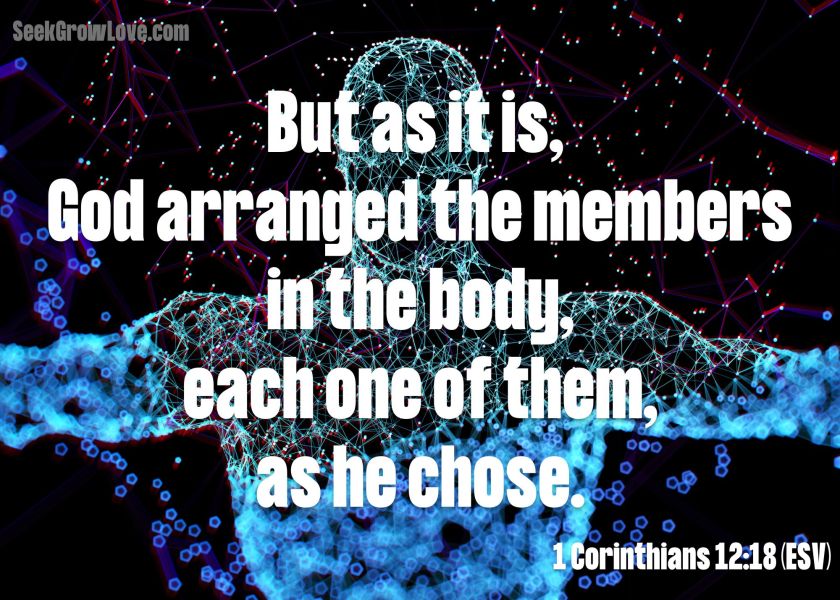
Old Testament: Judges 1-3
Poetry: Psalm 52
New Testament: 1 Corinthians 12
I love baseball. (If you don’t, don’t leave just yet, please). Baseball is a team sport. This was put on display for me recently. I was watching a Washington Nationals game this weekend and the commentators brought in a retired pitcher who used to play for the Nationals in their 2019 World Series winning season. During the playoffs that year, Anibal Sanchez came very close to pitching a no-hitter. It was broken up in the 8th inning by a Cardinals batter. When asked about it Sanchez said he wouldn’t have come close to having a no-hitter without his teammates making great plays. He said no pitcher should ever get sole credit for a no-hitter. It’s impossible without your teammates making plays. Sanchez wasn’t just being humble, he was 100% right. It takes a catcher to catch the pitch, fielders to make plays and throw the ball to first, outfielders to run and catch fly balls. Without good teammates, you can’t pitch a no-hitter. When a no-hitter does happen, or even rarer a perfect game, the pitcher gets the accolades and they stick a microphone in his face after the game, but it was a team effort.
The same is true for the Church. That’s what Paul was trying to get at in 1 Corinthians 12. There are a few people that are “up front” during a worship service. The worship leader, the soloist, the scripture reader, and the pastor all have visible roles and they are important. But they aren’t the only important people. Many important people are working behind the scenes in nearly invisible ways. The person running the sound system is important. The pianist, guitar player, and other musicians are important. The person who makes the coffee before Sunday School is important. The people who set up tables for Church dinners are important. The people who teach children’s church are important. The people who clean the bathrooms, take out the trash, and vacuum the floors are important. The people who buy toilet paper are important, very important. If those people don’t do their jobs what have you got? A mess. Also important are the people who type the bulletin and change the slides with the worship song lyrics, and the people who make sure that the heat is turned on or the a/c is turned on. All of these people are important. So are the people who faithfully place their financial contributions in the offering, and the people who count and collect those offerings, and the people who write checks so that the pastor can feed their family and the lights stay on. Even in smaller churches, it takes a lot of people to share their gifts and talents.
Apparently, in the Church at Corinth, there was a lot of jealousy and rivalry going on between Christians. It was causing division in the Church. The Apostle Paul wrote this letter to correct some of those problems. He wanted them to understand that Churches need to maintain unity to be healthy and carry out the mission that God has given us to do. Everyone in the church is not gifted in the same way. Some people love to be up front serving in visible ways. Some people are not gifted to speak or lead worship, but they have other gifts. I have a special needs sister, Christine, who wants to help and has claimed her gifts by handing out the church bulletins. She grabs a stack and goes to each person in Sunday School and gives them a bulletin. She wants to help by sharing her gifts. She also loves to sing very loudly in worship and her exuberance is infectious. (And she likes to say “amen” when her brother the preacher says that he’s winding up the sermon).
Read through all of the Apostle Paul’s letters in the New Testament and see how much Paul depended on others to help him carry out his ministry. Often when he wrote letters to encourage and teach Churches he was in jail for preaching the Gospel of Jesus, which was a threat to both the religious leaders and the Roman Empire. Paul depended on people to take the letters he wrote from prison and deliver them to the Churches. He also depended on people to bring him food, an extra blanket, his books and letters, and medicine. He had poor eyesight so he depended on a secretary to write down his words. He also longed for fellowship with other followers of Jesus. Paul was the face of much of the teaching and spread of the Church in the first century, but it took a team to support him.
What are some ways that you are serving in your Church? You can’t start too early. Our church has a 7-year-old help take up the offering some Sundays. As you read through 1 Corinthians 12, try not to get too bogged down thinking about the theological issues that continue to divide Christians today (are the spiritual gifts Paul mentions for now or did they stop after the first century?) It’s amazing how this chapter that Paul wrote to help a church not be divided has caused many Christians to disagree and divide. If God decides to give you the gift of miracles or healing, who am I to tell you that God did away with those gifts 1900 years ago? (if you do have the gifts of miracle or healing, please come visit me, I could use it.)
Remember, there is no “ I” in “Team”. And there is no I in Church. It’s all about how we use the gifts God has given each of us to serve.
Pastor Jeff Fletcher
Reflection Questions
- What similarities do you see between sports teams or work teams and the team work needed to carry out the work of Jesus and the Church?
- Are you currently using any of your gifts to help carry out the mission of the Church?
- Are you willing to test your gifts and potentially experience some failures and disappointments as you seek to carry out the mission of Jesus Christ and the Church? What will you try and risk next?









